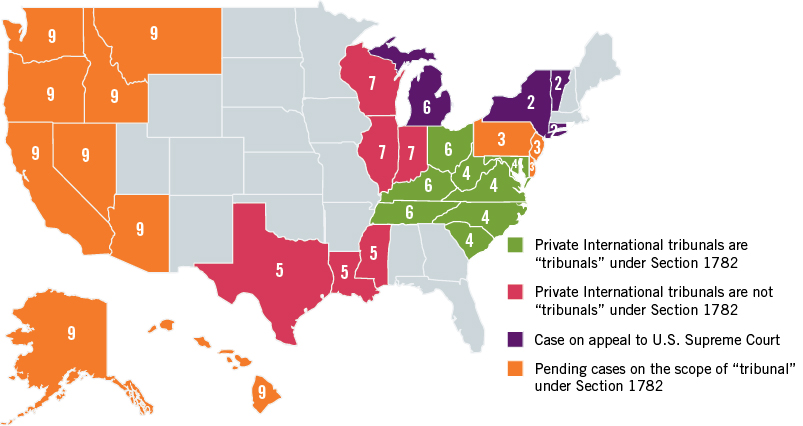U.S. Supreme Court to Review Circuit Split Over Scope of 28 U.S.C. § 1782 for Obtaining Discovery in International Arbitrations
As the popularity and pace of international arbitration has continued to grow, parties engaged in such arbitration outside the United States have increasingly relied on 28 U.S.C. § 1782 (Section 1782) to obtain discovery in the United States. The U.S. federal circuit courts, however, are divided over whether Section 1782 can be used to obtain information and documents in aid of private international arbitrations, or whether its application is limited to proceedings before foreign courts, foreign quasi-judicial proceedings, and other similar matters. This circuit split has existed for some time, and indeed was the subject of a prior alert.1 Although the U.S. Supreme Court appeared poised to address the issue in 2021,2 the parties then before the court settled their dispute before it could do so. The issue quickly resurfaced, however, when, in December 2021, the U.S. Supreme Court granted certiorari in two cases—ZF Auto. US v. Luxshare, Ltd.3 and AlixPartners v. The Fund for Prot. of Inv. Rights in Foreign States,4 which have been consolidated. Oral argument in these consolidated cases is scheduled for 23 March 2022. This article provides a renewed look at the Section 1782 landscape as that argument looms on the U.S. Supreme Court’s horizon.
Background: What is Section 1782?
Section 1782 allows a U.S. federal district court where a person or entity “resides or is found” to order such person or entity to produce documents or testimony for use in a “proceeding in a foreign or international tribunal.”5 Such an order may be made upon request of a foreign or international tribunal, or upon the application of any “interested person.”6 Because Section 1782 does not define “foreign or international tribunal,” the threshold issue for assessing a Section 1782 application is determining whether the proceeding where the discovery will be used qualifies as a “foreign or international tribunal” under the statute.
In 2004, the U.S. Supreme Court substantively examined Section 1782 for the first time in Intel Corp. v. Advanced Micro Devices, Inc.7 Among other issues, the Intel Court recognized that a “foreign or international tribunal” includes more than just foreign courts.8 In its decision, the Supreme Court concluded that the Directorate General for Competition of the Commission of the European Communities was a “foreign or international tribunal” under Section 1782 because the statute covers first instance decision-makers that render dispositive rulings subject to judicial review.9 The Supreme Court’s decision was limited to the specific tribunal before it and, accordingly, it did not address whether a private international arbitral tribunal constitutes a “foreign or international tribunal.”
The Growing Circuit Split––An Updated Look in 2022
In the wake of the Intel decision, U.S. federal circuit courts have reached different conclusions regarding whether a “foreign or international tribunal” includes a private international arbitral tribunal. Two circuit courts have held that Section 1782 extends to private arbitral tribunals, while three circuit courts have held that it does not. Cases concerning Section 1782’s scope also remain pending in two additional circuits.

On one side of the circuit split, the Fourth and Sixth Circuits have ruled that a private international arbitral tribunal is a “foreign or international tribunal” within the meaning of Section 1782.10 In Abdul Latif Jameel Transp. Co. Ltd. v. FedEx Corp., the Sixth Circuit held that Section 1782 allows for discovery assistance to private arbitral tribunals, based on the use of “tribunal” in legal writings, and in the statute itself, and determined that “the word ‘tribunal’ in § 1782(a) encompasses private, contracted-for commercial arbitrations.”11 In Servotronics, Inc. v. Boeing Co., the Fourth Circuit relied on the Sixth’s Circuit decision, but also noted that a previous version of Section 1782 had explicitly limited discovery assistance to “judicial proceeding[s] pending in any court in a foreign country,” whereas the current version is broader and therefore covers private arbitral tribunals.12
On the other side of the circuit split, the Second, Fifth, and Seventh Circuits have ruled that a private international arbitral tribunal is not a “foreign or international tribunal” within the meaning of Section 1782.13 The Second and Fifth Circuits relied on pre-Intel decisions from their jurisdictions, concluding that Intel did not impact the analysis of whether Section 1782 applies to disputes before private arbitral tribunals.14 In Servotronics, Inc. v. Rolls-Royce, the Seventh Circuit engaged in a detailed analysis of the statute, and relied on dictionary definitions of “tribunal,” the statutory context, and the related Federal Arbitration Act to conclude that a “‘foreign or international tribunal’ within the meaning of § 1782(a) is a state-sponsored, public, or quasi-governmental tribunal.”15
In addition to the five U.S. federal circuit courts that have weighed in on the issue, there are also pending cases regarding Section 1782’s scope in the Third and Ninth Circuits.16 Oral argument with respect to the Third Circuit case, In re Application of EWE Gasspeicher GmbH, was heard on 9 December 2020, and the decision remains pending. The Ninth Circuit, meanwhile, is holding In re Application of HRC-Hainan Holding Co. in abeyance, pending the outcome of the consolidated cases currently before the U.S. Supreme Court.17
The U.S. Supreme Court Agrees to Review the Circuit Split
On 10 December 2021, the U.S. Supreme Court granted certiorari and consolidated two cases—AlixPartners and ZF Auto. US—to address the scope of Section 1782 for the first time since Intel. The cases arise out of two Circuits that already have grappled with the issue—the Second Circuit and Eastern District of Michigan (within the Sixth Circuit), respectively.18
AlixPartners (2d Cir.). While the Second Circuit has ruled previously that Section 1782 does not apply to private commercial arbitrations, it recently held, in Fund for Prot. of Inv. Rights in Foreign States v. AlixPartners, that an arbitration held pursuant to an investment treaty is covered by Section 1782, and parties to such arbitrations can obtain discovery assistance from U.S. federal courts.19 The case arose out of a Section 1782 application for discovery from a U.S. entity to be used in an arbitration against Lithuania, pursuant to an investment treaty signed by Lithuania.20 In allowing the application, the Second Circuit distinguished investment treaty arbitrations from private commercial arbitrations because: 1) an international treaty explicitly created the tribunal’s format; 2) the same treaty created the tribunal’s jurisdiction; 3) a signatory of the treaty was a party to the dispute; and, 4) investment treaties serve important policy goals.21
ZF Auto (E.D. Mich.). Applying Sixth Circuit precedent on the application of Section 1782 to private commercial arbitrations, the Eastern District of Michigan allowed a Section 1782 application seeking discovery from a U.S. entity for use against that company in a private arbitration to be commenced in Germany.22The Eastern District of Michigan noted that “binding precedent from the Sixth Circuit” mandated that Section 1782 applied to private commercial arbitrations.23 The target of the Section 1782 application requested a stay of the decision based on the U.S. Supreme Court’s then-pending consideration of Servotronics, Inc. v. Rolls-Royce PLC, but the stay was denied.24
The U.S. Supreme Court’s forthcoming consideration of the two consolidated cases before it has the potential to resolve the circuit split regarding the scope of Section 1782. If the Supreme Court holds that private international arbitrations are covered by Section 1782, parties to such arbitrations will have a powerful tool for obtaining discovery across the United States and will not be limited to pursuing this discovery only in district courts within the Fourth and Sixth Circuits. Alternatively, the Court may adopt a middle ground and endorse the Second Circuit’s latest position—that investment treaty arbitrations are covered by Section 1782, but private arbitrations are not.25
Oral argument for the two consolidated cases is scheduled for 23 March 2022, and the Supreme Court will likely issue its decision by the end of summer 2022. K&L Gates will continue to monitor this matter for future updates.
This publication/newsletter is for informational purposes and does not contain or convey legal advice. The information herein should not be used or relied upon in regard to any particular facts or circumstances without first consulting a lawyer. Any views expressed herein are those of the author(s) and not necessarily those of the law firm's clients.








